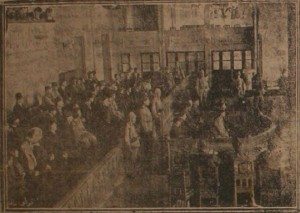ISTANBUL — Entire towns and districts are under siege. Tanks ram through narrow alleys closed off by barricades and trenches. Residents are trapped indoors for weeks because of curfews. Those who venture outside risk sniper fire. Their bodies lie on the streets for days before they can be collected. Bullets fly in through windows and buildings collapse under shelling, killing those seeking shelter at home.
One of the most affected places is the city of Diyarbakir’s historic Sur district, where I was mayor from 2004 to 2014. Sur has been under 24-hour curfew since the beginning of December. Many of its neighborhoods lie in ruins. Its historic buildings are damaged, once busy shops are shut, hospitals lack staff, and schools are closed. Tens of thousands of people have fled.
Sur’s walls surround an ancient city that has been inhabited for millenniums. Its narrow streets, spacious courtyards and elegant stone structures are reminders of a rich multicultural legacy — a legacy that has survived, albeit in an impoverished state, a century of conflict. Small but increasingly visible communities of Armenians, Assyrians, Chaldeans, Yazidis and other minorities live alongside adherents of diverse interpretations of Islam in what is now a predominantly Sunni Kurdish town.
Over the past decade, our municipality worked hard to revive and preserve this heritage. We oversaw the restoration of many historic buildings, including mosques and churches. The reopening of the Surp Giragos Armenian Church, which is now the largest Armenian church in the Middle East, after nearly a century in ruins has encouraged “hidden” survivors in Turkey of the 1915 genocide to rediscover and embrace their heritage. Efforts to restore the old synagogue in memory of Sur’s once vibrant Jewish community were underway before the eruption of violence last summer.
In 2012, Sur’s community leaders established an interfaith dialogue group bringing together representatives of the region’s different religions, cultures and civil society groups. Known as the Council of Forty, it has played a crucial role in keeping sectarian violence from reaching our city. Thanks to its efforts, Sur came to symbolize the vision of peaceful coexistence in a region plagued by intolerance.
It causes me immense grief to see that pluralism fall apart along with Sur’s buildings. Sectarianism is destroying Syria before our very eyes. To avoid the same fate in Turkey, the Council of Forty has called on the government to lift the curfews, and asked all sides to end hostilities and return to peace talks within the framework of parliamentary democracy.
President Recep Tayyip Erdogan said recently that military operations in the besieged Kurdish towns would continue until they were “cleansed” of ”terrorists.” “You will be annihilated in those houses, those buildings, those ditches which you have dug,” he threatened. But what peace can be built through destruction? Decades of military policies against the Kurds have shown only that violence begets more violence.
Many residents of these towns are poor families who were forced to flee the countryside when the conflict between the Kurds and the Turkish state was at its peak in the 1990s. Those who are digging trenches and declaring “self-rule” in Sur and other cities and towns of southeastern Turkey today are mostly Kurdish youths in their teens and 20s who were born into that earlier era of violence, poverty and displacement, and grew up in radicalized ghettos.
Now a new generation will grow up with the trauma of killing, destruction and forced migration. Where will they go? What will become of them? And how will an angrier generation of Kurds and Turks find common ground? The truth is that my generation may be the last to reach a peaceful settlement through dialogue.
Dialogue is possible when those in power want it. Last spring, the two sides were on the verge of a breakthrough after two and a half years of negotiations. The Kurds, when given a real and fair choice, have repeatedly picked politics over violence and opted for coexistence in a democratic Turkey, where their rights and identities are recognized, over separation. But as the destruction goes on, their faith in a political solution withers.
In 2007, Sur became the first municipality in Turkey to offer services in local languages, including Kurdish, Armenian and Assyrian, besides the official Turkish — a move that infuriated the authorities in Ankara, the capital, and led to my removal as mayor. In 2009, months after being re-elected with two-thirds of the vote, I was arrested on charges of separatism. (I was released five months later on health grounds and kept my role as mayor throughout my arrest.)
As I was rounded up along with hundreds of Kurdish activists and elected politicians, my teenage son left our house to join the P.K.K. “You are wasting time with your politics and dialogue,” he told me. I dedicated my life to trying to prove him wrong and bring him home in peace. I have been discouraged before, but never lost hope. Today, I struggle to keep that hope alive.


